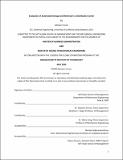Evaluation of automated storage and retrieval in a distribution center
Author(s)
Turner, Adriane(Adriane A.)
Download1191225340-MIT.pdf (1.375Mb)
Other Contributors
Sloan School of Management.
Massachusetts Institute of Technology. Department of Mechanical Engineering.
Leaders for Global Operations Program.
Advisor
Stephen Graves and Maria Yang.
Terms of use
Metadata
Show full item recordAbstract
In the face of e-commerce growth and rising customer delivery expectations, companies must adapt to meet shorter contract shipping requirements with existing infrastructures. The "Amazon effect", an evolution resulting in increased online shopping and direct-to-consumer order fulfillment, is reverberating through the retail industry and requiring manufacturers to evaluate their existing supply chain networks to meet two- and one-day shipping from their distribution centers (DC). This thesis evaluates speed and execution improvements using automated storage and retrieval systems (ASRS) in DCs. Adopting ASRS can provide the essential capability upgrades to reduce material processing time and meet direct-to-consumer deliveries. The ASRS analysis reviews current DC metrics, future throughput and inventory requirements, comparisons of ASRS technologies utilized today, expected impact of ASRS inside of an existing DC, and sizing and selection of an ASRS. Analysis of the DC evaluated showed that the primary cause of delays in shipping time was due to high variability in task completion time, rather than a high average completion time, causing extended wait times to propagate throughout the DC. While methods to reduce task time variation can be implemented, a warehouse logic upgrade would allow for real-time sequencing to get products shipped in the correct order based on factors like shipping method, customer, or priority. Implementation of ASRS in the DC evaluated could decrease processing time in storage and retrieval by 67% and total processing time through the DC by 37% due to ideal sequencing, diminished downstream variability, and reduced work in progress. The payback period for ASRS is projected to be 4 to 5 years..
Description
Thesis: M.B.A., Massachusetts Institute of Technology, Sloan School of Management, in conjunction with the Leaders for Global Operations Program at MIT, May, 2020 Thesis: S.M., Massachusetts Institute of Technology, Department of Mechanical Engineering, in conjunction with the Leaders for Global Operations Program at MIT, May, 2020 Cataloged from PDF version of thesis. Includes bibliographical references (pages 53-54).
Date issued
2020Department
Sloan School of Management; Massachusetts Institute of Technology. Department of Mechanical Engineering; Leaders for Global Operations ProgramPublisher
Massachusetts Institute of Technology
Keywords
Sloan School of Management., Mechanical Engineering., Leaders for Global Operations Program.